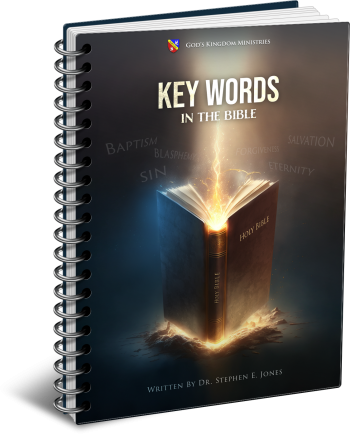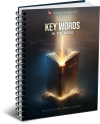Latest Posts
View the latest posts in an easy-to-read list format, with filtering options.

To understand what Scripture says, one must know the meaning of words and key concepts. This book is designed to prevent misunderstanding.
Category - General

Much of the New Testament was originally written in Hebrew or Aramaic and then translated into Greek to include a wider audience. In the fifth century, Jerome translated the Bible into Latin, and this became the standard for the church until the Protestant Reformers began to translate the word into the common languages of the people.
Some of the translations in the past few centuries simply translated the Latin translation (The Vulgate) into the languages of the common people. That, of course, was not the most accurate way to translate the Bible, and it caused some problems, which we will cover later.
We do need to understand, however, that the Greek text of the New Testament was a way of expressing Hebrew thoughts (and word definitions) into Greek, using the nearest equivalents. For this reason, when we study key Greek words, we should define them as if these were Hebrew words. In other words, aionian, regardless of its Greek definition, should be defined according to its Hebrew equivalent, olam.
The Septuagint was the Greek translation of the Old Testament, translated by 70 rabbis in Alexandria, Egypt, beginning around 280 B.C. The Septuagint served as a Hebrew-Greek dictionary of sorts, because it standardized the Greek words that best expressed the Hebrew equivalents. This is one of the keys to understanding the Greek words used in the New Testament. Most of the words do not make much difference, but a few of them are extremely important. Among these is the equivalency between aionian and olam.
Olam comes from the root word alam, “to hide.” Hebrew root words are written with three letters and they are always verbs. (Hebrew is the language of action and is the background of Paul’s distinction between grace and works in the matter of justification.) Olam is a noun that means “hidden.” When the word is applied to time, it means a hidden (unknown) period of time. One must look at the context to see the actual length of time. The word olam does not tell you, because it is indefinite and can be applied equally to a short or long space of time.
So we read in 1 Kings 10:3,
3 Solomon answered all her questions; nothing was hidden [alam] from the king which he did not explain to her.
Again, we read in Job 28:21,
21 Thus it is hidden [alam] from the eyes of all living and concealed from the birds of the sky.
David complained to God in Psalm 13:1,
1 How long, O Lord? Will You forget me forever [netsach, “properly, a goal, i.e. the bright object at a distance travelled towards”]? How long will You hide [alam] Your face from me?
It is clear that David did not know how long God would hide His face from him. However, the Hebrew word netsach paints a picture of the bright, splendid answer coming toward him. Yet our main point here is to show that the word alam is translated “hide.”
Aaron and his sons were given the portion of the heave offerings “forever” (olam) in Exodus 29:28. This lasted until the change of priesthood took place (Heb. 7:12), when Christ came as the high priest of the Melchizedek Order. Being of the tribe of Judah, Christ could not qualify as a high priest of Aaron (Heb. 7:14). Therefore, Aaron and his sons were called to receive a portion of the offerings for only an indefinite (and limited) period of time.
The same can be said of all the sacrifices in the law, which were to be offered “forever.” The daily sacrifices were to be offered every Day of Atonement by the anointed high priest on behalf of the nation. Lev. 16:34 says,
34 Now you shall have this as a permanent [olam] statute, to make atonement for the sons of Israel, for all their sins once every year…
Likewise, people were supposed to cleanse themselves with the ashes of a red heifer as “a perpetual (olam) statute” (Num. 19:10). How many Christians continue to follow this practice today? No one? Then how can this practice be said to be “perpetual” or “forever” (KJV)? To translate this “perpetual” goes against the New Testament understanding of the law. Christ’s death on the cross was the final sacrifice for sin, after which time, God began to disregard those animal sacrifices offered by the Aaronic high priests.
God also promised to give the land of Canaan to the Israelites “forever” (olam). We read this in Exodus 32:13,
13 … and all this land of which I have spoken, I will give to your descendants, and they shall inherit it forever [olam].
This “forever” lasted until the captivities of Israel and Judah. Though Judah returned after being in Babylon for 70 years, they too were ultimately cast out of the land by the Romans. In Heb. 8:6, 7, we read that God gave us…
6 … a better covenant, which has been enacted on better promises.” 7 For if that first covenant had been faultless, there would have been no occasion sought for a second.
Animal sacrifices had to come to an end in order to make way for something “better.” Christians should be thankful that olam does not mean “forever,” for if it did, there would be no room for Christ’s own sacrifice for sin.
Heb. 11:16 explains that Abraham and the other men and women of faith “desire a better country, that is, a heavenly one.” For this reason, God has “prepared a city for them,” by which is meant the heavenly city, New Jerusalem. Hence, the old land of Canaan had the appearance of the inheritance that God promised to Abraham, but in reality, it was only a type and shadow of the real promise that God had in mind. The old land was given to them olam, for an indefinite period of time, but the “better country” is given to the faithful permanently.
We see, then, how olam and its root, alam, ought not to be translated “forever” or “perpetual,” as if to say that we know precisely how long something is to last. Given enough time, of course, when the “forever” ends, that which is hidden is then revealed. But until that time comes, olam is a period of time that is unknown and therefore indefinite—not infinite, eternal, or everlasting.
Young’s Concordance and Young’s Literal Translation renders olam as “age-lasting.” Rotherham’s The Emphasized Bible renders it “age-during.” The Emphatic Diaglott (New Testament) avoids all controversy by refusing to translate aionian with any English equivalent, and this leaves the reader to form his/her own conclusion. These scholars all agree that the length of an olam time period is indefinite and hidden from us.
God made a covenant of a perpetual [olam] priesthood with Phinehas, the grandson of Aaron. We read of this in Num. 25:12, 13,
12 Therefore say, “Behold, I give him My covenant of peace; 13 and it shall be for him and his descendants after him, a covenant of a perpetual [olam] priesthood, because he was jealous for his God and made atonement for the sons of Israel.”
The KJV translates this “an everlasting priesthood.” But was it really “everlasting”? No. His dynasty lasted only until the time of Solomon, when the high priest, Abiathar, was replaced by Zadok, who was of a different priestly family. This “everlasting priesthood,” given to Phinehas “and his descendants after him,” lasted only 437 years.
1 Kings 2:27, 35 says,
27 So Solomon dismissed Abiathar from being priest to the Lord, in order to fulfill the word of the Lord, which He had spoken concerning the house of Eli in Shiloh... 35 The king appointed Benaiah the son of Jehoiada over the army in his [Joab’s] place, and the king appointed Zadok the priest in the place of Abiathar.
So what can we say about the promises of God? Did God’s covenant with Phinehas fail? Was his priesthood really “everlasting” or “perpetual”? The answer is NO, but it was certainly olam. It was to last indefinitely, depending on how long his descendants remained true to God. The actual time was “hidden” until the day Abiathar was replaced by Zadok.
Jonah, too, was in the belly of the whale “forever” (olam), as we read in Jonah 2:5, 6,
5 Water encompassed me to the point of death. The great deep engulfed me, weeds were wrapped around my head. 6 I descended to the roots of the mountains. The earth with its bars was around me forever [olam], but You have brought up my life from the pit, O Lord my God.
Jonah’s “forever” turned out to be “three days and three nights” (Jonah 1:17). We are fortunate indeed that Jonah did not remain forever in the belly of the whale, for he was a type of Christ. We would not want Jesus to be in the grave “forever.” Instead, we see Him raised from the dead (2 Tim. 2:8), and this is our hope as well.